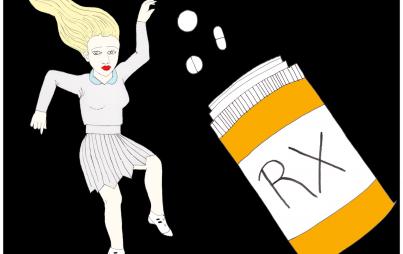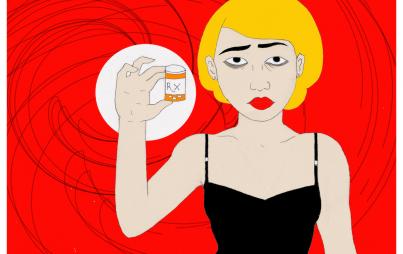
It’s the black cloud that never, ever goes away — despite the resilience it has armored me with.
The church was on the corner of two busy avenues. Once inside, silence set in, as if there was a divine element at play. Up the staircase two flights, we sat in a large wooden room, a space the church had saved for group meet-ups or study or — in this case — community Alcoholics Anonymous meetings. As the bodies poured in, some haggard and still struggling, others young and new to vice — perhaps court mandated to be there, echoes of voices saying, “good evening” and “welcome” bounced off the towering windows. There were four on each side and the light pooled in softly, surrounding us all. At night, the windows shone blackness. It always felt like such a personal, careful space. Deliberate and safe. I went there several times per week.
I was 13.
My mother seated us in the back so that we could read and fidget without distracting the others. We weren’t the only kids there, but there weren’t many of us. We didn’t have family to watch us, and looking back, I realize how hard my mother must have worked to heal — while raising children. But it didn’t always work so well, sadly, as we were put into foster care later on.
The AA meetings we attended were usually pretty full. It was humbling to see so many men and women admit their weaknesses; it was heartbreaking to know that some people wouldn’t make it back.
So much of my childhood was underscored by the idea of the proverbial wagon — off the wagon, and on it again and off it and on it.
Someone once said it was selfish for my mother to have brought us to these meetings — that no child should ever be exposed to the kind of stories we heard. Stories of children being taken away, stories of car accidents killing family members, stories of used needles, stories of never hearing from their spouses again. Bodies ravaged by heroine. Methadone skin and shaking hands. And some bodies that belied their sufferings, which I remember always confused me. I felt they were somehow more representative of the insidious nature of abuse; they were ticking time bombs of rock-bottom. They were not ugly yet, but they could be.
What sort of life would I have led without this?
I could say I’d be happier (which is certainly true)! But I have learned the tremendous burden of love over the years, which has taught me to live without blame, to see through the monster, to forgive.
When I saw my mother speak for the first time at the podium, she nervously — and yet courageously — spoke of Step 9 of the 12 Step Program, which is that one must make amends for what they've done and ask for forgiveness from those they love. When she spoke about us, her children, I could not look her in the eye; her openness embarrassed me. I often wonder if that hurt her, but I was listening. I heard her admit that she’d failed us, that she’d lost everything to drugs, but that she was committed to doing everything she could to rebuild her life. Our lives.
No addiction or recovery story is the same. You don’t always kick the habit and you don’t always find the forgiveness which you seek. Around 60% of addicts relapse, according to the U.S. government. Others die. Others end up prison. Others lose their kids. Some make a full recovery. This may sound bleak, but addiction is a disease — and its causes vary greatly. It’s not just that someone selfishly prefers to take drugs — wanting to significantly ruin the lives of everyone around them — it’s that it is literally a “chronic, relapsing brain disease that is characterized by compulsive drug seeking and use… despite harmful consequences.”
We’re essentially talking about spiritual possession, except that addiction is based in scientifically proven fact.
It’s not that a glass of Malbec will magically lead to crack cocaine. It’s the mindset. It’s the weakness. It’s a disconnect from the mind and body. And it’s very real.
So living with a parent who is in recovery has been a challenge, since the process of “recovery” is always and “recovered” is never. One never says they are no longer an alcoholic; they are simply in remission. The beast is always in there, and that’s why you work to tame it.
Relapse is, of course, what a child of an addict must worry about. The worry, depending on the family, isn't just about that, of course. For poorer families, it could be about losing your house because your father can’t work. And for wealthier families, it could be about being laughed at by your peers because your mother is slurring at dinner.
But it’s always, for everyone, watching someone you love disappear. It knows no boundaries.
And then there are addicts who have been “sober” for a long time, but they haven’t kicked their vices completely. These types rear their heads during the holidays. They’re the just one glass of wine addicts, who believe they have come so far and deserve to live like a dignified human capable of having just a glass. Maybe some are, but some are not.
A glass of wine, for an addict, is always a gateway. It’s not that a glass of Malbec will magically lead to crack cocaine. It’s the mindset. It’s the weakness. It’s a disconnect from the mind and body. And it’s very real. Having a parent go through these cycles means having the patience and understanding at family dinners or holiday get-togethers to understand that.
It’s important to be supportive and communicative with your parent — whether you’re in the throes of addiction and withdrawal or later, years after they got sober. According to addiction.com, you can show your support by offering to drive them to meetings, avoiding triggering situations, attending support groups like Al-Anon — which are designed for family members and loved ones — and looking into getting counseling sessions for the family. Sometimes, the hardest thing you can do is to stop enabling the person altogether. Take it from me.
Watching the person you love or the person who raised you struggle with their demons is enough to hurt you down the line. I have been experiencing PTSD and anxiety for years because of my family’s drug and alcohol issues. It’s the black cloud that never, ever goes away — despite the resilience it has armored me with.
Self-care is the most important thing for anyone watching someone you love suffer; and while it may sound selfish, staying healthy and clear-headed is tantamount to knowing how to move through your grief — and supporting the person hurting.
There is so much darkness; you must know how to stay in the light.
And to this day, I wonder if my family will remain safe and healthy. There are have been some years of doubt, and some years of pride. And when you know someone is battling themselves, it’s a different animal. Remember that wherever you are in this journey, you are not alone.
If you are a parent in recovery and in need of advice, here is a great place to start.
If you’re a loved one, family member or child, it is so important you do not go through it alone. Seek a support network, talk to a counselor and attend Al-Anon meetings. Here are some resources.
HELPLINE: 1-855-DRUGFREE








